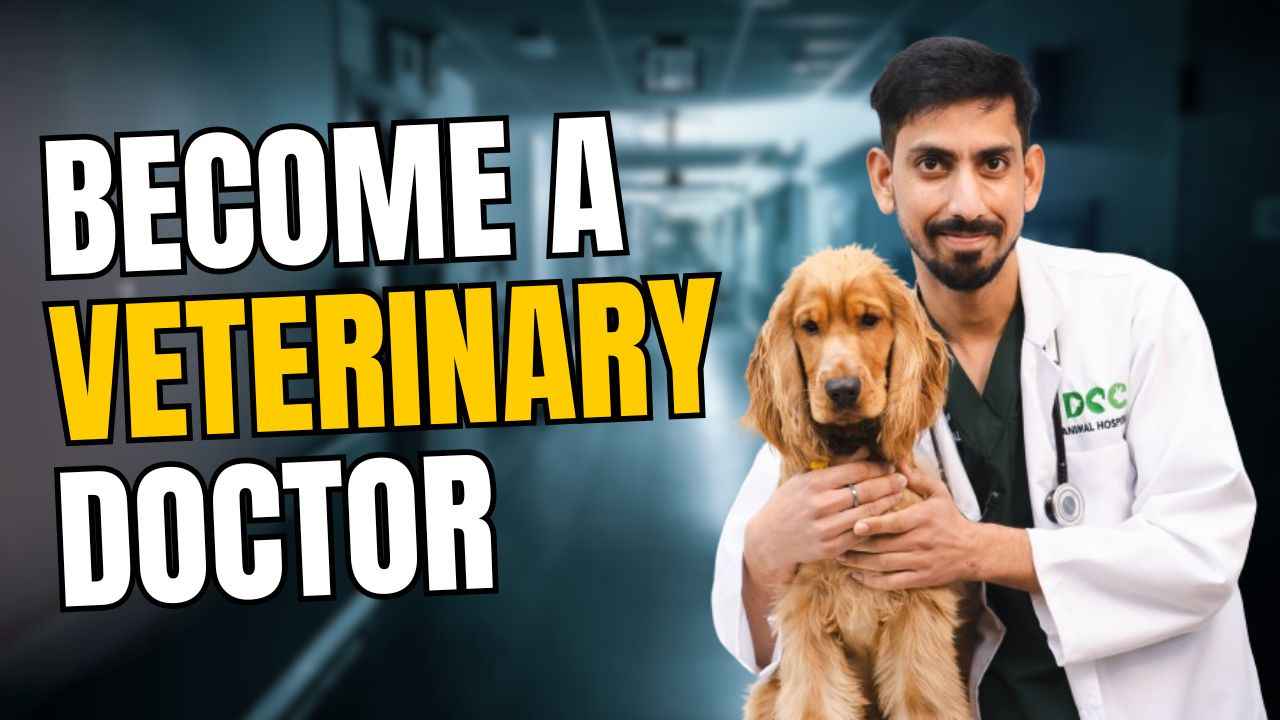India, a land with a rich cultural heritage and a deep-rooted connection to animals, offers a promising career path for aspiring veterinarians. Veterinary medicine is a noble profession that combines scientific knowledge, empathy, and a love for animals, enabling practitioners to contribute significantly to animal health, welfare, and public health. This comprehensive guide will provide a detailed roadmap on how to become a qualified Veterinary Doctor (V.D.) in India, outlining the educational qualifications, career opportunities, and rewarding experiences that await you in this fulfilling field.
Step 1: Educational Qualifications
a. Undergraduate Education:
The first step towards becoming a Veterinary Doctor in India is to pursue a Bachelor of Veterinary Science and Animal Husbandry (B.V.Sc. & A.H.) degree from a recognized Veterinary College or University in India. This undergraduate program typically spans five years and includes a combination of theoretical and practical training in various aspects of veterinary medicine, including:
- Animal Anatomy, Physiology, and Biochemistry
- Animal Nutrition and Feeding
- Animal Husbandry and Management
- Animal Diseases and Parasitology
- Veterinary Microbiology and Pathology
- Veterinary Pharmacology and Therapeutics
- Veterinary Surgery and Reproductive Medicine
- Animal Welfare and Ethics
b. Post-Graduate Education:
After completing your B.V.Sc. & A.H. degree, you can opt for further specialization by pursuing a Master’s degree (M.V.Sc.) or a Doctorate (Ph.D.) in a specific field of veterinary medicine. This advanced education provides in-depth knowledge and research skills, preparing you for specialized roles in areas such as:
- Veterinary Pathology
- Veterinary Microbiology
- Veterinary Surgery
- Veterinary Medicine
- Veterinary Public Health
Top 10 Veterinary Colleges in India
| College Name | Location |
|---|---|
| Indian Veterinary Research Institute (IVRI) | Bareilly, Uttar Pradesh |
| Tamil Nadu Veterinary and Animal Sciences University (TANUVAS) | Chennai, Tamil Nadu |
| College of Veterinary Science, GADVASU | Ludhiana, Punjab |
| College of Veterinary Science and Animal Husbandry | Anand, Gujarat |
| Bombay Veterinary College | Mumbai, Maharashtra |
| Govind Ballabh Pant University of Agriculture and Technology | Pantnagar, Uttarakhand |
| Veterinary College and Research Institute | Namakkal, Tamil Nadu |
| Karnataka Veterinary, Animal and Fisheries Sciences University | Bidar, Karnataka |
| Rajiv Gandhi Institute of Veterinary Education and Research | Puducherry |
| West Bengal University of Animal and Fishery Sciences (WBUAFS) | Kolkata, West Bengal |
Step 2: Licensing and Registration
Upon successful completion of your B.V.Sc. & A.H. degree, you must obtain a Veterinary Council of India (VCI) license to practice veterinary medicine in India. The VCI is the statutory body responsible for regulating veterinary education and practice in the country. To obtain a license, you need to:
- Apply to the VCI with the required documents, including your degree certificate and internship completion certificate.
- Appear for and pass the Veterinary Council of India (VCI) National Eligibility Test (NET).
Once you have your VCI license, you must register with the Veterinary Council of your respective state to practice legally within its jurisdiction.
Step 3: Internship and Practical Experience
During the final year of your B.V.Sc. & A.H. degree, you are required to complete a mandatory one-year internship under the supervision of a qualified veterinarian. This internship provides you with practical hands-on experience in various aspects of veterinary medicine, including:
- Clinical diagnosis and treatment of animals
- Animal husbandry and management practices
- Veterinary surgical procedures
- Public health and preventive medicine
Step 4: Career Opportunities
With a V.D. degree, you will have a diverse range of career options to choose from, including:
a. Clinical Veterinary Practice:
- Private veterinary clinics and hospitals
- Government veterinary hospitals and dispensaries
- Veterinary extension services
- Animal welfare organizations
b. Veterinary Research and Education:
- Veterinary colleges and universities
- Research institutions and laboratories
- Pharmaceutical and animal health companies
c. Veterinary Public Health:
- Government veterinary public health departments
- Food safety and inspection agencies
- Zoonosis control programs
d. Animal Husbandry and Management:
- Livestock farms and breeding centers
- Animal shelters and rescue organizations
- Dairy and poultry industries

Career Options for Veterinary Doctors in India
| Career Option | Work Setting | Approximate Salary |
|---|---|---|
| Private Veterinary Practice | Private Clinics, Hospitals | ₹3-8 Lakhs per annum |
| Government Veterinary Services | Government Hospitals, Animal Welfare | ₹5-10 Lakhs per annum |
| Veterinary Surgeon | Specialty Clinics, Hospitals | ₹6-15 Lakhs per annum |
| Animal Nutritionist | Research Institutes, Feed Companies | ₹4-8 Lakhs per annum |
| Veterinary Pathologist | Research Labs, Diagnostic Centers | ₹6-12 Lakhs per annum |
| Animal Welfare Officer | NGOs, Animal Welfare Organizations | ₹3-7 Lakhs per annum |
| Wildlife Veterinarian | Zoos, Wildlife Reserves, NGOs | ₹5-10 Lakhs per annum |
| Veterinary Consultant | Freelance, Consultancy Firms | ₹4-12 Lakhs per annum |
| Veterinary Researcher | Research Institutes, Universities | ₹5-15 Lakhs per annum |
| Veterinary Lecturer/Professor | Veterinary Colleges, Universities | ₹6-12 Lakhs per annum |
| Zoo Veterinarian | Zoos, Safari Parks | ₹4-8 Lakhs per annum |
| Animal Husbandry Specialist | Farms, Livestock Industry | ₹5-9 Lakhs per annum |
Notes:
Salary Range: The salaries mentioned are approximate and can vary depending on location, experience, and the type of organization.
Career Growth: Veterinary doctors can pursue further specialization, certifications, and advanced degrees to enhance their career prospects.
Step 5: Skills and Qualities of a Veterinary Doctor
In addition to the educational qualifications and practical experience, aspiring Veterinary Doctors should possess the following skills and qualities:
- Empathy and Compassion: A genuine love for animals and a desire to improve their well-being are fundamental traits of a successful veterinarian.
- Scientific Aptitude: A strong understanding of biological sciences, including anatomy, physiology, and pathology, is essential for diagnosing and treating animal diseases.
- Problem-Solving Abilities: Veterinary medicine often presents complex challenges, requiring critical thinking and problem-solving skills to find effective solutions.
- Communication Skills: Clear and effective communication is vital for interacting with clients, animal owners, and colleagues.
- Physical Stamina: Veterinary work can involve physically demanding tasks, such as restraining animals, performing surgeries, and working in challenging environments.
Conclusion
Becoming a Veterinary Doctor in India is a rewarding and fulfilling career path that combines scientific knowledge, empathy, and a passion for animal welfare. By following the steps outlined in this comprehensive guide, you can embark on a journey that will empower you to make a meaningful contribution to the health and well-being of animals, while also safeguarding public health and promoting responsible animal ownership practices.
FAQs on Becoming a Veterinary Doctor in India
1. What is the eligibility criteria to become a veterinary doctor in India?
Ans: 12th pass in Science stream with PCB (Physics, Chemistry, Biology) or Agriculture.
2. Which entrance exam do I need to clear?
Ans: The Veterinary Council of India (VCI) conducts the Veterinary Aptitude Test (VAT).
3. What is the duration of the Veterinary Doctor (BVSc & AH) course?
Ans: Five years (four and a half years of academic and six months of internship).
4. What are the different colleges in India that offer the BVSc & AH course?
Ans: List of top veterinary colleges in India:
1) Indian Veterinary Research Institute, Bareilly
2) National Dairy Research Institute, Karnal
3) Kerala Veterinary and Animal Sciences University, Wayanad
4) Rajiv Gandhi College of Veterinary and Animal Sciences, Puducherry
5) G.B. Pant University of Agriculture and Technology, Pantnagar
5. What is the fees structure for the BVSc & AH course?
Ans: Fees can vary depending on the college, ranging from approximately INR 1 lakh to INR 4 lakhs per annum.
6. What are the career opportunities after completing the BVSc & AH course?
Ans: Veterinarians can work in veterinary clinics, research laboratories, animal husbandry departments, livestock farms, pet care industry, etc.
7. Can I pursue higher studies in veterinary science after BVSc & AH?
Ans: Yes, you can pursue Master’s (MVSc) and Doctorate (PhD) degrees in various veterinary disciplines.
8. What are the essential skills for a veterinary doctor?
Ans: Strong knowledge of veterinary medicine, excellent communication and interpersonal skills, compassion for animals, problem-solving abilities, etc.
9. Is there a shortage of veterinary doctors in India?
Ans: Yes, there is a significant shortage of qualified veterinary doctors in India, especially in rural areas.
10. What is the salary range for a veterinary doctor in India?
Ans: Salary varies based on experience, location, and employer. Fresh graduates can expect a starting salary of around INR 15,000-25,000 per month, while experienced professionals can earn up to INR 1 lakh per month or more.

Hi there, I’m Dr. Danish, the person writing on Mini NEET. I’m a doctor, and I want to make it easier for you to understand the NEET exam and medical studies.
I know how tough it can be to get ready for NEET. That’s why I’m here to give you simple and helpful advice to make studying easier.
I want Mini NEET to be a place where you feel supported and encouraged. Whether you’re just starting out or already studying medicine, I’m here to help you succeed.
Let’s work together on Mini NEET to make your journey in medicine a little bit easier.

